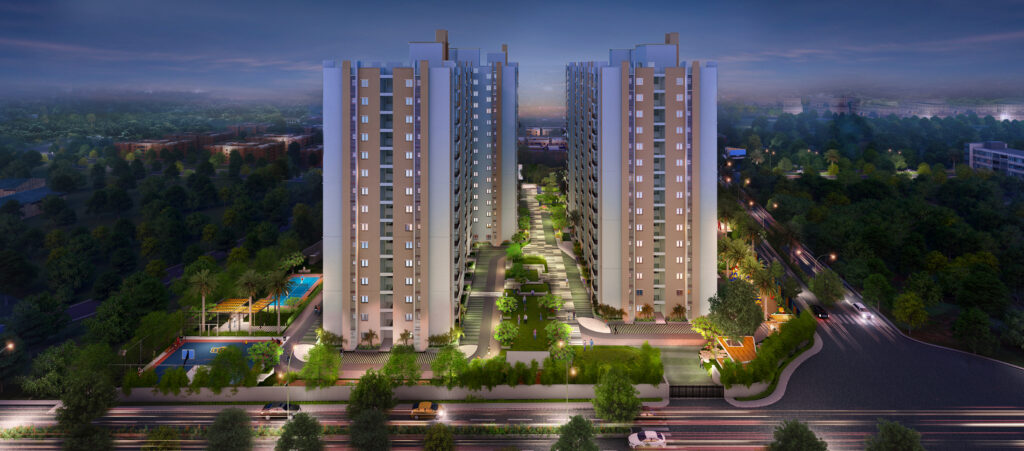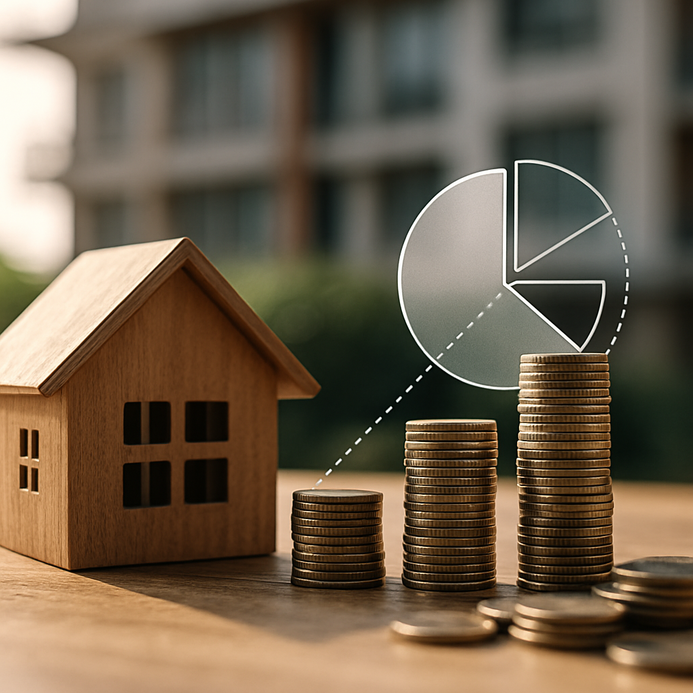Driving Growth: The Economic Influence of Indian Real Estate
The Indian real estate sector is one of the largest and most important sectors in the Indian economy. It contributes significantly to the country’s GDP and provides employment to millions of people. The sector is also a major driver of economic growth, as it stimulates investment and consumption.
Housing demand
The Indian population is growing rapidly. In 2024, the population is estimated to be around 1.4 billion people. This growth is putting a strain on the housing market, as there is not enough housing to meet the demand. The government is trying to address this issue by focusing on affordable housing.

The government has introduced a number of schemes to promote affordable housing. These schemes include the Pradhan Mantri Awas Yojana (PMAY), which is a flagship scheme of the government to provide affordable housing to the urban poor. The PMAY offers a number of benefits to developers who build affordable housing, such as subsidies, tax breaks, and land allotment. The government’s focus on affordable housing is boosting demand for housing in the affordable segment. This is leading to the development of new affordable housing projects across the country. The growth of the affordable housing segment is expected to continue in the coming years, as the government continues to focus on this segment.
Here are some of the key factors driving demand for housing in India:
- Rising population: The Indian population is growing rapidly, and this is putting a strain on the housing market.
- Increasing urbanisation: The country is becoming increasingly urbanised, and this is leading to a demand for housing in urban areas.
- Rising incomes: The incomes of Indians are rising, and this is making it possible for more people to afford housing.
- Government initiatives: The government is focusing on affordable housing, and this is boosting demand for housing in the affordable segment.
Investment
The real estate sector is a popular investment destination for both domestic and foreign investors. This is due to the sector’s long-term growth prospects and the high returns that it can offer. Here are some of the reasons why real estate is a good investment:
- Long-term growth prospects: The Indian real estate sector is expected to grow at a CAGR of 8-10% in the coming years. This growth is being driven by a number of factors, including population growth, urbanisation, and rising incomes.
- High returns: Real estate can offer high returns on investment. In some cases, investors have been able to earn returns of up to 20% per year.
- Tangible asset: Real estate is a tangible asset, which means that it is something that you can touch and feel. This makes it a more secure investment than some other asset classes, such as stocks and bonds.
- Tax benefits: The government offers a number of tax benefits to investors who invest in real estate. These benefits can help to reduce the cost of investment and increase the returns.
Employment
The real estate sector is a major employer in India. It is estimated that the sector employs around 10% of the country’s workforce, or around 50 million people. This makes the real estate sector one of the largest employers in India, after agriculture and manufacturing.

The real estate sector provides jobs to people in a variety of roles, including:
- Construction workers: Construction workers are responsible for building and maintaining real estate properties. They include masons, carpenters, electricians, and plumbers.
- Architects: Architects are responsible for designing real estate properties. They work with clients to understand their needs and create a design that meets those needs.
- Engineers: Engineers are responsible for ensuring that real estate properties are safe and structurally sound. They work with architects to create plans and specifications for construction.
- Real estate agents: Real estate agents are responsible for helping people buy, sell, and rent real estate properties. They work with clients to find the right property for their needs and negotiate the best possible price.
The real estate sector is a growing sector in India. The demand for housing is increasing due to the country’s growing population and urbanisation. This is leading to the creation of new jobs in the real estate sector. The real estate sector is expected to continue to grow in the coming years, and this is expected to lead to the creation of more jobs.
GDP contribution
It is estimated to have contributed around 7% of the GDP. This contribution is expected to grow in the coming years, as the sector continues to grow.

The real estate sector contributes to the GDP in a number of ways, including:
- Construction: The construction of new real estate projects creates jobs and stimulates the economy.
- Sales: The sale of real estate properties generates revenue for the government and businesses.
- Rent: The rental of real estate properties generates income for landlords and businesses.
- Financing: The financing of real estate transactions creates jobs and stimulates the economy.
Economic growth
The real estate sector is a major driver of economic growth. It stimulates investment and consumption, which leads to job creation and increased economic activity.

Here are some of the ways in which the real estate sector drives economic growth:
- Investment: The real estate sector is a popular investment destination for both domestic and foreign investors. This investment helps to stimulate the economy by creating jobs and generating income.
- Consumption: When people buy or rent real estate, they spend money on a variety of goods and services, such as furniture, appliances, and home improvement. This spending boosts the economy.
- Job creation: The real estate sector is a major employer in India. It is estimated that the sector employs around 10% of the country’s workforce, or around 50 million people. This makes the real estate sector one of the largest employers in India, after agriculture and manufacturing.
- Infrastructure development: The real estate sector drives infrastructure development. It requires roads, bridges, power, water, and other infrastructure to support construction and development. This infrastructure development benefits the entire economy, as it makes it easier for businesses to operate and for people to live and work.
Technology adoption
The real estate sector is adopting new technologies at a rapid pace. This is helping to improve efficiency, reduce costs, and improve customer service. Some of the technologies that are being adopted by the real estate sector:
- Virtual reality: Virtual reality (VR) is being used to allow potential buyers to experience properties without having to physically visit them. This can save time and money for both buyers and sellers.
- Augmented reality: Augmented reality (AR) is being used to provide information about properties to potential buyers. This can be done by overlaying information on top of a live video feed of the property.
- Artificial intelligence: Artificial intelligence (AI) is being used to automate tasks, such as lead generation and property management. This can free up time for real estate professionals to focus on providing better service to their clients.
- Big data: Big data is being used to analyze trends and identify opportunities. This can help real estate professionals make better decisions about where to invest and how to market their properties.
The adoption of new technologies is transforming the real estate sector. It is making it easier for buyers and sellers to find each other, and it is providing real estate professionals with the tools they need to provide better service.


ASBL ensures timely and high quality delivery of our projects through new-age construction technology. Our Indigenous project planning and management software ‘Inncircles Arena’ is the first-of-its-kind in real estate, and is built to achieve large-scale construction and punctual delivery timelines, without loss of quality. This software is 100 per cent AWP-compliant and works as a virtual operational model.
Sustainability
The real estate sector is increasingly focusing on sustainability. This is leading to the development of green buildings and other sustainable initiatives. Here are some of the reasons why the real estate sector is focusing on sustainability:
- Environmental concerns: The real estate sector is a major contributor to climate change and other environmental problems. Buildings are responsible for around 40% of global energy consumption and 30% of greenhouse gas emissions.
- Economic benefits: Sustainability can lead to economic benefits, such as lower operating costs, increased property values, and improved tenant satisfaction.
- Government regulations: Governments are increasingly regulating the real estate sector to reduce its environmental impact. For example, the European Union has a directive that requires all new buildings to be nearly zero-energy buildings by 2020.
Here are some of the sustainable initiatives that are being adopted by the real estate sector:
- Green buildings: Green buildings are designed to be energy-efficient, water-efficient, and environmentally friendly. They use sustainable materials, such as recycled content and reclaimed wood, and they incorporate features such as solar panels and rainwater harvesting systems.
- Sustainable design: Sustainable design is the practice of designing buildings and communities that are environmentally friendly and that meet the needs of the people who live and work in them. Sustainable design can include features such as green roofs, natural ventilation, and daylighting.
- Sustainable operations: Sustainable operations are the practices that are used to maintain and operate buildings in a way that is environmentally friendly. Sustainable operations can include practices such as energy efficiency, water conservation, and waste reduction.
Regulation
the real estate sector is subject to a number of regulations. These regulations are designed to protect consumers, ensure transparency, and promote fair competition.


Some of the most important real estate regulations:
- Real Estate (Regulation and Development) Act, 2016 (RERA): RERA is a central law that regulates the real estate sector in India. It was enacted to protect the interests of home buyers and to promote transparency in the sector. RERA requires all real estate projects to be registered with the RERA authority in the state where the project is located. It also requires developers to disclose certain information to home buyers, such as the project plan, the builder’s track record, and the terms and conditions of the sale.
- Transfer of Property Act, 1882: The Transfer of Property Act is a central law that governs the transfer of property in India. It sets out the rules for how property can be bought, sold, leased, and mortgaged. The Act also provides for certain protections for buyers and sellers, such as the right to inspect the property before purchase and the right to rescind the contract if the property is not as represented.
- Real Estate Appellate Tribunal Act, 2016: The Real Estate Appellate Tribunal Act is a central law that establishes an appellate tribunal for the real estate sector. The tribunal is responsible for hearing appeals against orders passed by the RERA authority.
- State-specific regulations: In addition to the central laws, there are also a number of state-specific regulations that govern the real estate sector. These regulations vary from state to state, but they typically cover similar topics, such as registration of real estate projects, disclosure of information to buyers, and dispute resolution.
Hyderabad real estate market
The Hyderabad real estate market is one of the most vibrant and fastest-growing markets in India. The city is attracting a lot of investment from both domestic and foreign investors. This is due to a number of factors, including the city’s strategic location, strong economic growth, and favourable investment climate.

The Hyderabad real estate market is expected to continue to grow in the coming years. This is due to the city’s strong economic fundamentals and the government’s focus on infrastructure development. The city is also becoming a popular destination for IT and ITeS companies, which is boosting demand for commercial real estate. Here are some of the key trends in the Hyderabad real estate market:
- Demand for affordable housing: There is a growing demand for affordable housing in Hyderabad. This is due to the city’s rising population and the government’s focus on affordable housing.
- Demand for commercial real estate: The demand for commercial real estate is growing in Hyderabad. This is due to the city’s growing economy and the increasing number of IT and ITeS companies setting up shop in the city.
- Growth of the luxury segment: The luxury segment is also growing in Hyderabad. This is due to the city’s rising affluence and the increasing number of high-net-worth individuals looking to invest in real estate.
Check out ASBL Spire, ASBL Springs and ASBL Spectra
The Indian real estate market is driven by a number of factors, including:
- Economic growth: India’s economy is growing rapidly, and incomes are rising. This will lead to an increase in demand for real estate, as people will have more money to spend on housing and other properties.
- Urbanisation: India is a rapidly urbanising country, and the number of people living in cities is expected to continue to grow in the coming years. This will create a demand for housing and other real estate in urban areas.
- Government initiatives: The government is taking a number of initiatives to boost the real estate sector. These initiatives include providing tax breaks for homebuyers, developing infrastructure, and promoting affordable housing.













